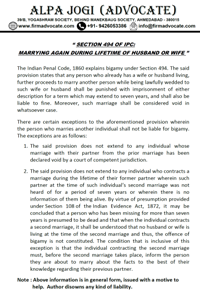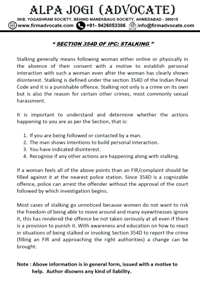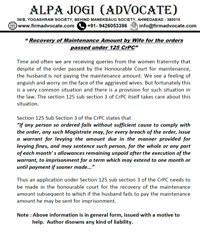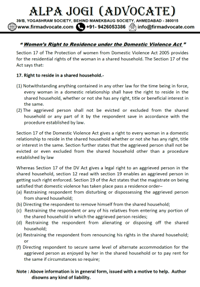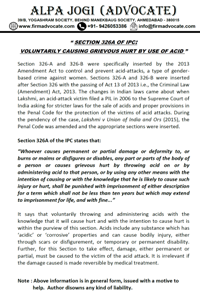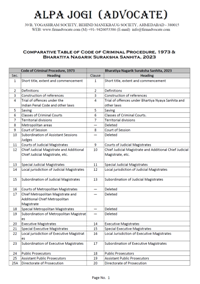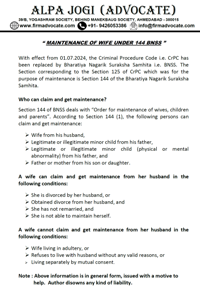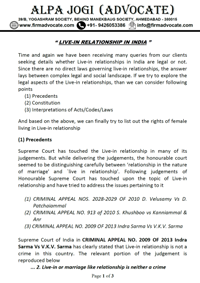ARTICLES
The notion of Legal literacy is based on the principle that every individual must be aware of their rights and obligations. The maxim 'ignorantia juris non-excusat,' or 'ignorance of the law is no excuse,' implies that the Court presumes that every person is aware of the law and ignorance to Law is no excuse.
Thus, based on above maxim, it can be inferred that all the persons are expected to know the laws. Here, in the Articles section, we have tried to touch upon such small topic of Laws, which are helpful to the common people and which the common people are also expected to be aware about.
Maintenance of Wife Under 125 CrPC
Who can claim and get maintenance?
Section 125 of Cr.PC deals with “Order for maintenance of wives, children and parents”. According to Section 125(1), the following persons can claim and get maintenance:
- 1. Wife from his husband
- 2. Legitimate or illegitimate minor child from his father
- 3. Legitimate or illegitimate minor child (physical or mental abnormality) from his father and
- 4. Father or mother from his son or daughter.
The Protection of Women from Domestic Violence Act, 2005
The domestic violence in this Country is rampant and several women encounter violence in some form or the other or almost everyday. However, it is the least reported form of cruel behaviour. A woman resigns her fate to the never ending cycle of enduring violence and discrimination as a daughter, a sister, a wife, a mother, a partner, a single woman in her lifetime due to absence of laws addressing women’s issues.
Till the year 2005, the remedies available to a victim of domestic violence were limited.
Zero FIR
Zero FIR is an FIR registered in a police station that does not have jurisdiction over the spot where the crime was committed. Many a times, a crime is committed in one police zone but one ends up in a police station in another police zone to lodge the FIR. The police mostly refuses to lodge the FIR, asking the complainant to go to the police station of the zone in which the crime was committed.
Most people do not know about Zero FIR.
Divorce By Mutual Consent Under Hindu Law
In case where both the Husband and Wife decide that they do not want to remain married to each other or cannot live with one another they can seek divorce by mutual consent under Section 13B of the Hindu Marriage Act.
Essentials of divorce by mutual consent are as below
1)Parties should be living separately
Section 13(B) of the Act prescribes that in order to mutually dissolve a marriage, the spouses should be living separately for a period of at least 1 year before filing the petition.
Adverse Possession
Adverse possession is when the true owner of a property loses his/her ownership rights owing to inaction on his/her part to remove a person in possession within a statutory period from the property. After lapse of the statutory limitation period for eviction, the true owner is barred from initiating any legal proceeding to repossess his/her property and the person in possession acquires the title to that property by adverse possession.
The statutory period of limitation for possession of an immovable property or any interest therein, as stipulated in section 65 of Limitation Act, 1963, is 12 years in case of private property...
Order 1 Rule 10
Order 1 Rule 10 of Code of Civil Procedure (herein after referred as C.P.C.) enables the court to add any person as party at any stage of the proceedings, if the person whose presence before the court is necessary in order to enable the court effectively and completely adjudicate upon and settle all the questions involved in the suit. Avoidance of multiplicity of proceedings is also one of the objects of the said provision.
It is a well settled principle of law that basically, it is for the plaintiff in a suit to identify the parties against whom he has any grievance and to implead them as defendants in the suit filed for necessary relief...
Limitation Act 1963
The law of limitation finds its root in the maxim “vigilantibus non dormientibus Jura subveniunt” which means the law will assist only those who are vigilant with their rights and not those who sleep upon it. The law of limitation specifies the statutory time frame within which a person may initiate a legal proceeding or a legal action can be brought. If a suit is filed after the expiry of the time prescribed it will be barred by the Limitation. It means that a suit brought before the Court after the expiry of the time within which a legal proceeding should’ve been initiated will be restricted.
The Law of limitation prescribes a time period within which a right can be enforced in a Court of Law...
Dowry Death IPC 304B
Downy death and bride burning are unfortunate development of our societal setup. The lawmakers taking things note of the grave problem enacted a new provision to make the law pragmatic and practical. In 1986 a special provision Section 304B was inserted in the IPC to deal with dowry deaths. A simultaneous amendment was made in the Indian Evidence Act, 1872 in the form of Section 113B. The rule of evidence to prove the offense of dowry death is contained in Section 113B, Evidence Act providing for presumption as to dowry death.
The essentials of Section 304B are as follows:...
Difference between cognizable and non-cognizable offences
Cognizable Offence:
Offences that are punishable with not less than 3 years of imprisonment are serious offences and are considered cognizable. The Criminal Procedure Code, 1973 (CrPC) under Section 2(c) states that an offence that is punishable with death, imprisonment for life, or imprisonment for more than 3 years shall be cognizable. Cognizable offences are those in which the police can arrest the accused without a warrant. The police can also begin an investigation without the permission of the court. The accused is arrested and produced before the court at the stipulated time...
Marrying Again During lifetime of Husband or Wife IPC 494
The Indian Penal Code, 1860 explains bigamy under Section 494. The said provision states that any person who already has a wife or husband living, further proceeds to marry another person while being lawfully wedded to such wife or husband shall be punished with imprisonment of either description for a term which may extend to seven years, and shall also be liable to fine. Moreover, such marriage shall be considered void in whatsoever case.
There are certain exceptions to the aforementioned provision wherein...
Difference Between Judgement, Decree And Order
JUDGEMENT:
Under Section 2(9) of the Code of Civil Procedure, 1908 a Judgement means the statement given by the Judge on the grounds of a decree or order. Judgement refers to the reasoning given by the court in order to support the decision.
Essentials of a Judgement:
(1) A concise statement of the case.
(2) Point for determination.
Divorce decree is required for applying for the category of female divorcee in Government Jobs
Time and again we have been advising our clients that getting a divorce decree from the Competent Court is always advisable despite owing the fact that customary divorce is permissible in their caste/tribe.
Honourable High Court of Judicature for Rajasthan at Jodhpur in D.B. Special Appeal (Writ) No.72/2022...
Appointment of Court Commission under CPC
The purpose of issuing commission by the court is to impart complete justice to the parties to the suit. The power of issuing commission rests totally in the discretion of the judges. By issuing a commission in a particular case, the Court performs an in-depth investigation where the Court deems necessary.
Issuing of Commission can be made by the Court if it gets an application from the parties, stating the necessity for the same or sue – moto. Section 75 to 78 of the Code of Civil Procedure, 1908 speaks about the discretionary power of the Civil Courts and Order 26 to issue commission for the furtherance of complete justice. According to Section 75 of the Code of Civil Procedure, 1908, the court may issue a commission for any of the following purposes...
IPC 354D Stalking
Stalking generally means following woman either online or physically in the absence of their consent with a motive to establish personal interaction with such a woman even after the woman has clearly shown disinterest. Stalking is defined under the section 354D of the Indian Penal Code and it is a punishable offence. Stalking not only is a crime on its own but is also the reason for certain other crimes, most commonly sexual harassment.
It is important to understand and determine whether the actions happening to you are as per the Section, that is:
Recovery of Maintenance Amount by Wife for the orders passed under 125 CrPC
Time and often we are receiving queries from the women fraternity that despite of the order passed by the Honourable Court for maintenance, the husband is not paying the maintenance amount. We see a feeling of anguish and worry on the face of the aggrieved wives. But fortunately this is a very common situation and there is a provision for such situation in the law. The section 125 sub section 3 of CrPC itself takes care about this situation.
Right to Residence for women under the Domestic Violence Act
Section 17 of The Protection of women from Domestic Violence Act 2005 provides for the residential rights of the woman in a shared household. The Section 17 of the Act says that:
17. Right to reside in a shared household.-
(1) Notwithstanding anything contained in any other law for the time being in force, every woman in a domestic relationship shall have the right to reside in the shared household, whether or not she has any right, title or...
IPC 354C Voyeurism
The origin of the word “voyeurism” is voyeur, which is a French word meaning “one who looks.” It refers to an action by any male of looking at a woman secretly in such a manner that invades someone else's personal space and privacy. Voyeurism is the most prevalent and potentially illegal sexual conduct but the complexity of the criminal justice system, lack of awareness of the criminal procedure, and reluctance to report sexual offenses to the police can all make victims of sexual crimes hesitant to report such crimes.
Provisions of Voyeurism under IPC - 354C
“Section 354C. Voyeurism.—Any man who watches or captures the image of a woman engaging in a private act...
CPC Order V Rule 20
(1) Where the Court is satisfied that there is reason to believe that the defendant is keeping out of the way for the purpose of avoiding service, or that for any other reason the summons cannot be served in the ordinary way, the Court shall order the summons to be served by affixing a copy thereof in some conspicuous place in the Court-house, and also upon some conspicuous part of the house (if any) in which the defendant is known to have last resided or carried on business or personally worked for gain, or in such other manner as the Court thinks fit.
(1A)Where the Court acting under sub-rule (1) orders service by an advertisement in a newspaper, the newspaper shall be a daily newspaper circulating in the locality in...
SECTION 326A OF IPC:VOLUNTARILY CAUSING GRIEVOUS HURT BY USE OF ACID
Section 326-A and 326-B were specifically inserted by the 2013 Amendment Act to control and prevent acid-attacks, a type of gender-based crime against women. Sections 326-A and 326-B were inserted after Section 326 with the passing of Act 13 of 2013 i.e., the Criminal Law (Amendment) Act, 2013. The changes in Indian laws came about when Lakshmi, an acid-attack victim filed a PIL in 2006 to the Supreme Court of India asking for stricter laws for the sale of acids and proper provisions in the Penal Code for the protection of the victims of acid attacks. During the pendency of the case, Lakshmi v Union of India and Ors (2015), the Penal Code was amended and the appropriate sections were inserted....
SECTION 11 OF CPC:RES JUDICATA
The doctrine of Res Judicata has been defined in Section 11 of the Civil Procedure Code. The doctrine of the Res Judicata means the matter is already judged. It means that no court will have the power to try any fresh suit or issues which has been already settled in the former suit between the same parties. Also, the court will not try the suits and issue between those parties under whom the same parties are litigating under the same title and matter are already been judged and decided by the competent court. When the court finds any suits or issues which has been already decided by the court and there is no appeal pending before in any court, the court has the power to dispose of the case by granting a decree of Res Judicata....
IPC 97 : Right of private defence of the body and of property
In simple terms, the right of private defence is the right to self-preserve in the face of imminent threat or danger. This right becomes available for use when one is exposed to threat or danger at the hands of an aggressor/ assailant. The danger or threat should be of such gravity that it becomes absolutely incumbent on the defender to act/react immediately in his defence lest he risks a loss of life or property.
Section 97 of The Indian Penal Code (IPC) states that...
Order XI Rule 14 of Civil Procedure Code (CPC)
Order XI Rule 14 of CPC states that
14. Production of documents - It shall be lawful for the court, at any time during the pendency of any suit, to Order the production by any party thereto, upon oath, of such of the documents in his possession or power, relating to any matter in question in such suit, as the court shall think right; and the court may deal with such documents, when produced, in such manner as shall appear just....
Maternity Benifit Act
The Maternity Benefit Act of 1961 take cares about “maternity benefits” of female employees. Any business with more than 10 employees must follow this rule. The Act is a significant piece of legislation that safeguards motherhood’s honour.It also makes sure that working mothers can provide their kids the care they need. Maternity benefits assist women financially in addition to defending women’s rights. The 2017 Maternity Amendment Bill further altered this law....
Comparison Table of Indian Penal Code 1860 and Bharatiya Nyay Sanhita 2023
Here you can ready the Comparison Table of Indian Penal Code 1860 and Bharatiya Nyay Sanhita 2023 i.e. which old IPC section is available in the newly introduced law of Bharatiya Nyay Sanhita 2023....
Comparison Table of Criminal Procedure Code 1973 and Bharatiya Nagarik Suraksha Sanhita 2023
Here you can ready the Comparison Table of Criminal Procedure Code 1973 and Bharatiya Nagarik Suraksha Sanhita 2023 i.e. which old CrPC section is available in the newly introduced law of Bharatiya Nagarik Suraksha Sanhita 2023....
Section 144 of BNSS
With effect from 01.07.2024, the Criminal Procedure Code i.e. CrPC has been replaced by Bharatiya Nagarik Suraksha Samhita i.e. BNSS. The Section corresponding to the Section 125 of CrPC which was for the purpose of maintenance is Section 144 of the Bharatiya Nagarik Suraksha Samhita....
Live-in Relationship in India
Time and again we have been receiving many queries from our clients seeking details whether Live-in relationships in India are legal or not. Since there are no direct laws governing live-in relationships, the answer lays between complex legal and social landscape. If we try to explore the legal aspects of the Live-in relationships, than we can consider following points.
(1) Precedents
(2) Constitution
(3) Interpretations of Acts/Codes/Laws....









